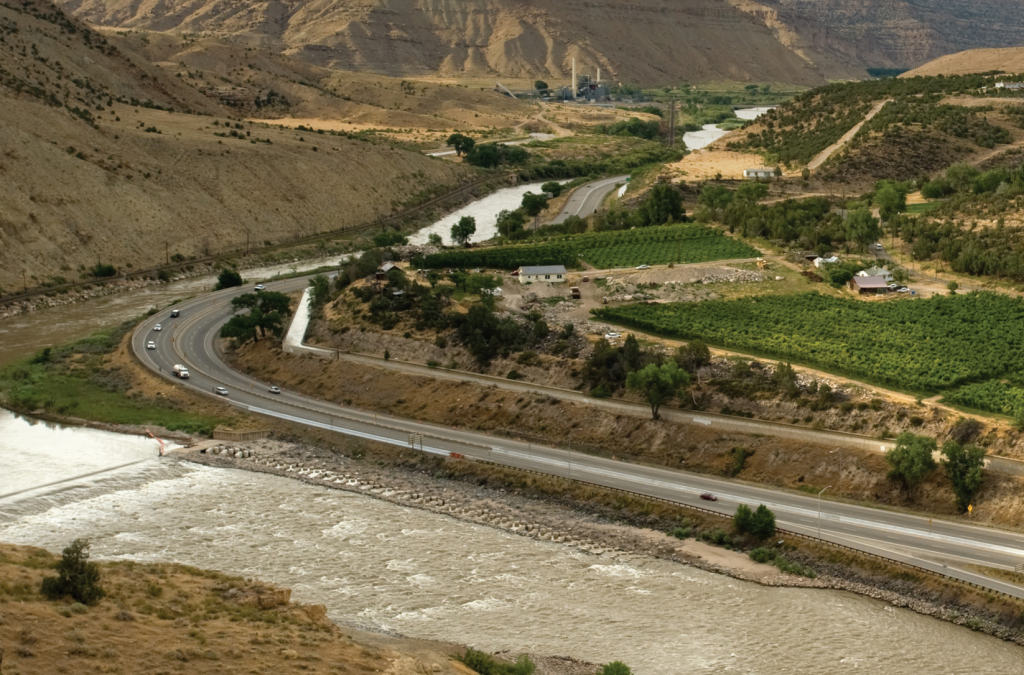Colorado won’t be buying up agricultural water rights to reduce water use and help stabilize the Colorado River, according to a briefing top river officials provided state lawmakers last week.
Rebecca Mitchell, Colorado’s representative on the Upper Colorado River Commission, reassured lawmakers that the state would not buy agricultural water rights from growers as part of any program to reduce Colorado River water use within the state.
Asked by Rep. Barbara McLachlan, D-Durango, whether the state wants to permanently acquire water from agriculture, Mitchell responded with an emphatic “No … We don’t have our eyes set on agricultural [water] rights.”
She also emphasized that whatever policies Colorado considers “should focus on making our own state stronger… We need to do this to protect Colorado.”
Mitchell’s comments came at a meeting of the legislature’s Water Resources and Agriculture Review Committee Aug. 23 in Steamboat Springs, held during the Colorado Water Congress Summer Conference.
The Colorado River, despite a bountiful water year thus far, has been mired in a 23-plus year drought, believed to be the worst in at least 1,200 years, and it is witnessing alarming reductions in flows due to climate change and overuse.
Last year lakes Powell and Mead, the river’s largest reservoirs, dropped to historic lows and federal officials ordered all seven Colorado River Basin states to permanently reduce water use by 2 million acre-feet to 4 million acre-feet annually.
This summer critical negotiations on how to continue to operate the river beyond 2026, when current operating guidelines expire, have begun. Mitchell said it was critical the new federal operating guidelines change the way water is released from lakes Powell and Mead. “Operations at Lake Powell and Lake Mead must respond to actual hydrology [how much the river produces] and available water supply.” She noted that currently, in eight out of 10 years, more water leaves Lake Powell than comes in.
As the crisis on the river continues, Colorado water users, growers and lawmakers have been asking for more clarity and more assurances on how the state intends to protect their water interests and help stabilize the giant river system.
Because agriculture uses roughly 80% of the Colorado River’s supplies, a major focus across the seven-state basin is on how to reduce agricultural water use while maintaining farm economies and food production.
Earlier this year a new federal program, known as the System Conservation Pilot Program (SCPP), launched, but it received little interest from Colorado growers.
It used federal funds to provide incentives to Upper Basin irrigators to temporarily reduce their use of Colorado River water.
Chuck Cullom, executive director of the Upper Colorado River Commission, the agency that represents Colorado, New Mexico, Utah and Wyoming on Colorado River issues, said the idea was “to demonstrate that the Upper Basin has the tools to manage water uses and to take actions necessary to live within the means of the river.”
But the results so far have been disappointing, with low farmer participation and only 2,700 acre-feet of water conserved. Cullom said there is no commitment yet to run the SCPP again in 2024.
Rep. Marc Catlin, R-Montrose, asked how it might be improved. Cullom said the program would need to operate differently, including starting earlier, developing different pricing policies, and providing more clarity on the program’s purpose and scope, among other things.
Sen. Dylan Roberts, D-Avon, asked what additional tools could help agriculture engage in more conservation? Based on feedback he has received from water users, Cullom suggested expanding investments in irrigation efficiency infrastructure—such as canal lining, sprinkler drip systems, center pivot irrigation—and growing alternative crops.
Key to maintaining ownership of water, under Colorado law, is to demonstrate it is being used. Some growers fear that if they reduce use through conservation techniques, their water rights could be taken from them.
Roberts asked Mitchell if Colorado should consider a recently enacted Arizona law that protects agricultural water users who invest in greater efficiencies from losing their water rights. She thought the state already offered those protections “at some level” and would get back to the committee to see if they could be expanded.
Roberts said it would be a good idea “if we could give them assurances in law that they won’t lose their water rights just because they tried to be more efficient.”
Fresh Water News is an independent, nonpartisan news initiative of Water Education Colorado. WEco is funded by multiple donors. Our editorial policy and donor list can be viewed at wateredco.org.


 Print
Print